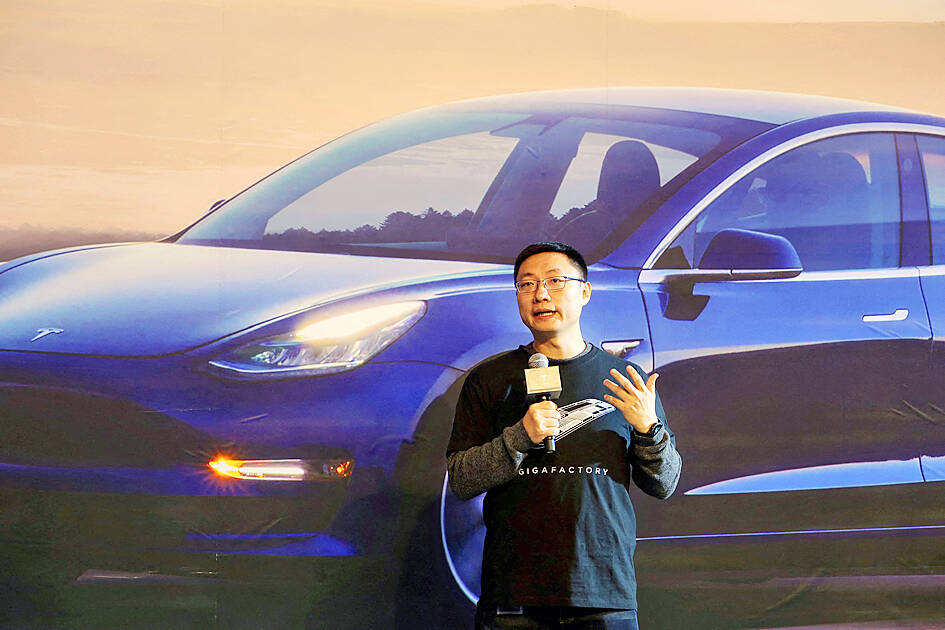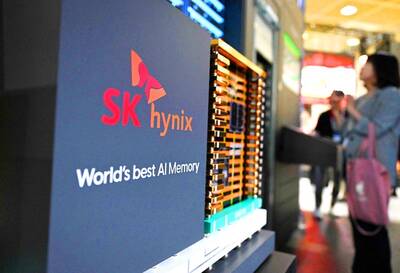Tesla Inc delivered fewer vehicles than analysts expected last quarter, missing estimates despite taking the unusual step of offering hefty incentives in its two biggest markets.
The company handed over 405,278 vehicles to customers in the past three months, short of the 420,760 average estimate compiled by Bloomberg.
While the total was a quarterly record for the company, it opened two new assembly plants last year and still came up short of its goal to expand deliveries by 50 percent.

Photo: Reuters
After Tesla chief executive officer Elon Musk predicted an “epic” end to the year, the comapny proceeded to cut vehicle prices and production in China, then offered US$7,500 discounts in the US.
Concerns about rising interest rates, inflation and other economic headwinds — plus alarm over Musk’s antics on Twitter Inc, which he now owns — sent Tesla shares plunging 37 percent last month and 65 percent last year.
“We believe that Tesla is facing a significant demand problem,” Toni Sacconaghi, a Bernstein analyst with the equivalent of a sell rating on the stock, wrote in a report on Monday.
“We believe Tesla will need to either reduce its growth targets (and run its factories below capacity) or sustain and potentially increase recent price cuts globally, pressuring margins,” Sacconaghi wrote.
Tesla increased deliveries by 40 percent to 1.31 million last year, shy of the 50 percent average annual growth rate the company has said it expects to achieve over multiple years. Production expanded 47 percent to 1.37 million.
The company produced 439,701 vehicles in the fourth quarter of last year, exceeding deliveries by 34,423 units.
It continued to transition to “a more even regional mix of vehicle builds,” which led to another increase in cars in transit at the end of the quarter, Tesla said.
The company’s quarterly delivery figures are widely seen as a barometer for electric vehicle demand, as the Austin, Texas-based company has led the charge for battery-powered cars.
The company does not break down sales by region, but the US and China are its largest markets, and 95 percent of sales last year were of the Model 3 sedan and Model Y crossover.
The company makes the Model S, X, 3 and Y at its factory in Fremont, California. Its Shanghai plant produces the Model 3 and Y, and it started delivering Model Ys from its newest plants in Austin and near Berlin in the first half of last year.
While Musk handed over Tesla’s first Semi trucks to PepsiCo Inc last month, the company did not report any deliveries of the model in its quarterly statement.
Tom Zhu (朱曉彤), Tesla’s head of China, has taken over responsibilities for sales, service and deliveries in North America, online news site Electrek reported on Monday, citing sources familiar with the matter.
Zhu’s official title remains vice president in charge of Asia-Pacific, according to the report on the US Web site dedicated to news on electric transportation and sustainable energy.
Zhu and his team from Shanghai have been traveling to Tesla plants in California and Texas prompting talk among colleagues that he is being groomed for a bigger role at a time when Musk has been focused on his purchase of Twitter, Reuters reported last month.
Under Zhu’s leadership, Tesla Shanghai rebounded strongly from lockdowns this year to bring Tesla close to its target for last year of 50 percent production growth.
Separately, South Korea’s antitrust watchdog is to fine Tesla 2.8 billion won (US$2.2 million) for alleged contraventions of advertising law.
Tesla falsely promoted and exaggerated the driving range and charging speed of its electric vehicles, as well as the estimated savings on fuel costs, Seoul’s Korea Fair Trade Commission said in a statement yesterday.
The company changed the advertisement on its Korean-language Web site in February when the watchdog started an investigation.
The regulator plans to levy an additional penalty of 1 million won on Tesla for contravening the Electronic Commerce Act, saying that the automaker did not provide enough information to consumers on its cancellation policy.
Additional reporting by Reuters

Intel Corp chief executive officer Lip-Bu Tan (陳立武) is expected to meet with Taiwanese suppliers next month in conjunction with the opening of the Computex Taipei trade show, supply chain sources said on Monday. The visit, the first for Tan to Taiwan since assuming his new post last month, would be aimed at enhancing Intel’s ties with suppliers in Taiwan as he attempts to help turn around the struggling US chipmaker, the sources said. Tan is to hold a banquet to celebrate Intel’s 40-year presence in Taiwan before Computex opens on May 20 and invite dozens of Taiwanese suppliers to exchange views

Application-specific integrated circuit designer Faraday Technology Corp (智原) yesterday said that although revenue this quarter would decline 30 percent from last quarter, it retained its full-year forecast of revenue growth of 100 percent. The company attributed the quarterly drop to a slowdown in customers’ production of chips using Faraday’s advanced packaging technology. The company is still confident about its revenue growth this year, given its strong “design-win” — or the projects it won to help customers design their chips, Faraday president Steve Wang (王國雍) told an online earnings conference. “The design-win this year is better than we expected. We believe we will win

Power supply and electronic components maker Delta Electronics Inc (台達電) yesterday said it plans to ship its new 1 megawatt charging systems for electric trucks and buses in the first half of next year at the earliest. The new charging piles, which deliver up to 1 megawatt of charging power, are designed for heavy-duty electric vehicles, and support a maximum current of 1,500 amperes and output of 1,250 volts, Delta said in a news release. “If everything goes smoothly, we could begin shipping those new charging systems as early as in the first half of next year,” a company official said. The new

SK Hynix Inc warned of increased volatility in the second half of this year despite resilient demand for artificial intelligence (AI) memory chips from big tech providers, reflecting the uncertainty surrounding US tariffs. The company reported a better-than-projected 158 percent jump in March-quarter operating income, propelled in part by stockpiling ahead of US President Donald Trump’s tariffs. SK Hynix stuck with a forecast for a doubling in demand for the high-bandwidth memory (HBM) essential to Nvidia Corp’s AI accelerators, which in turn drive giant data centers built by the likes of Microsoft Corp and Amazon.com Inc. That SK Hynix is maintaining its